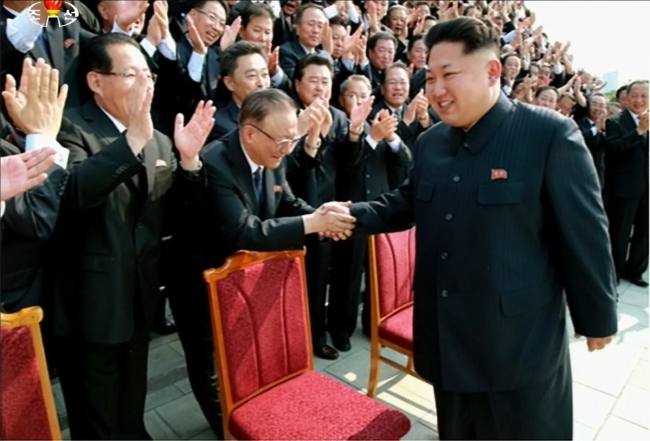Following Tuesday’s landmark deal over Iran’s nuclear program, questions are being raised over whether the accord would offer momentum for progress on North Korea’s denuclearization, with analysts torn over the deal’s implications for the peninsular standoff.
Some analysts say that after the U.S. took steps to normalize relations with Iran and Cuba -- two of its three longtime foes, conditions have become more conducive for Washington to pay more attention to North Korea’s nuclear issues.
But others argue that with a full plate of policy tasks concerning the implementation of the multilateral deal with Iran, Washington may already have its hands full and still remain reluctant to deal with the North that has claimed to be a nuclear-power state.
“After the Obama administration took power from the Bush administration, a series of issues stemming from the Cold War era, such as those concerning Cuba and Myanmar, have been addressed, forming the broad international landscape for openness, coexistence and compromise,” said Park Myung-lim, a political scientist at Yonsei University.
“So in light of this trend, the Iran deal could play a positive role in terms of adding pressure for North Korea’s denuclearization.”
Park, however, noted that the most challenging issue for now is that, unlike two former North Korean leaders who stably managed the regime, current leader Kim Jong-un is likely to adhere more to the nuclear program due to the country’s deepening isolation and moribund economy.
“Kim could be using the nuclear card to address all of its internal and external issues, including domestic instability, isolation, poor economy and the normalization of ties with the U.S. and South Korea, and so forth.”
Taking a cautious stance on the implications of the Iranian deal for North Korea, analysts said it was inappropriate to compare North Korea and Iran, given the different status of their nuclear weapons technology and their participation in the global non-proliferation regime.
Iran is still a member of the Nuclear Non-Proliferation Treaty. But the North, which entered the NPT regime in 1985, broke away from the treaty in 1993, reentered it later and withdrew from it again in 2003, which has created international distrust toward the North.
Tehran has also argued that its nuclear program is for peaceful purposes, including medical use, while Pyongyang describes itself as a nuclear-armed state in its constitution and has openly adopted a policy of simultaneously pursuing the development of nuclear arms and its economy.
Iran has not conducted any major nuclear tests, while the North carried out nuclear tests in 2006, 2009 and 2013, arguing that it has already entered the technical phase “to miniaturize and diversify its nuclear bombs.”
Another difference between the two is that economic sanctions for the oil-rich Islamic Republic are critical for its trade, while the impact of the sanctions on the North are much weaker, as its economy is largely disconnected from the international system.
After the deal with Iran, U.S. State Department spokesperson John Kirby told Yonhap News that the deal clearly demonstrated Washington’s willingness to engage with countries with whom the U.S. has “long-standing differences.”
But he stressed, “Pyongyang’s attempts to engage in dialogue while keeping critical elements of its weapons program running are unacceptable,” while noting that the U.S. is ready for negotiations with the North if the negotiations are “authentic and credible.”
Chang Yong-seok, a senior analyst at Seoul National University’s Institute for Peace and Unification Studies, expressed doubts over the speculation that after the deal with Iran, the U.S. could pay more attention to Pyongyang.
“I am rather cautious about whether the U.S. would move in the near future to address the North Korean issue, as there would be many follow-up measures to do to implement the Iran deal including its talks with the Congress,” he said.
“Plus … when there is no guarantee that there would be progress to be made in negotiations with the North, which sticks to its nuclear weapons program and calls itself a nuclear power, Washington may not want to spend much time or put policy efforts into the issue.”
After all, Seoul will have a critical role to play in bringing Pyongyang to the negotiating table and seeking a resolution to the nuclear issue, particularly when Washington faces a domestic political situation which is unfavorable to tackling the North Korean nuclear issue, analysts said.
“North Korea sticks to its nuclear program for its regime and national survival. So, Seoul needs to find a way to assure the North that denuclearization would not endanger its regime, and that it is not pursuing any regime instability or unification by forcibly absorbing the North,” a North Korea expert said, requesting anonymity.
“Of course, the critical thing for Seoul is to gain U.S. support for its North Korea policy, particularly, there is growing strategic distrust from the U.S. due to its policy to strengthen its strategic partnership with China.”
By Song Sang-ho (
sshluck@heraldcorp.com)








![[Today’s K-pop] Blackpink’s Jennie, Lisa invited to Coachella as solo acts](http://res.heraldm.com/phpwas/restmb_idxmake.php?idx=644&simg=/content/image/2024/11/21/20241121050099_0.jpg)